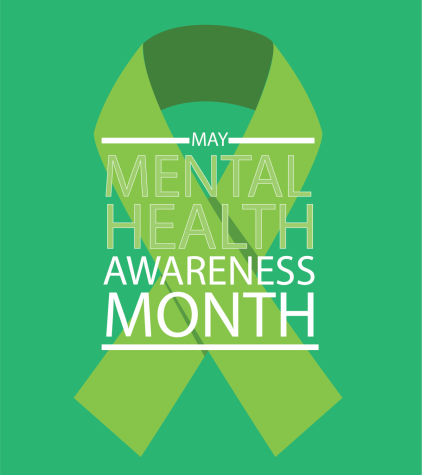Mental health out in the open
Pandemic allows people to talk about mental health with less stigma
May 19, 2021

While May has been observed as Mental Health Awareness month since 1949, mental health struggles became more apparent during the pandemic. The impact of fear and isolation did not go unnoticed.
Mental health is not without stigma. It often is given connotations of shame, but when the pandemic hit, people got sick, people died, and everyone was isolated for a long period of time. There was no denying that there was a common theme of struggling.
“During the pandemic, about 4 in 10 adults in the U.S. have reported symptoms of anxiety or depressive disorder,” according to the Kaiser Family Foundation.
Humans are social creatures; they need to interact with people. For extroverted types, quarantining with limited human interaction was against their nature. Seeing friends and family became a health risk rather than an everyday activity.
Business administration major Raegan Figgins, like many, felt isolated and struggled with mental health during quarantine. Fortunately, she felt more comfortable talking about it once she got to college.
“Coming here where everyone was taking the same online classes and following the same protocol was really nice because nobody had any problem talking about how it sucked; because that’s all you could talk about,” said Figgins.
Students are not the only ones drawing these conclusions. Professionals are starting to make the same observations. Psychiatrist Jessica Gold wrote about in her article “We’re Basically All Struggling With Mental Health Right Now–Let’s Normalize It.”
“Our conversations in the workplace, with our friends and family, and on social media seem to have shifted to be more real, and perhaps more open and vulnerable, at least based on what I’m seeing. As a psychiatrist, this makes me hopeful that we can finally normalize what it means to struggle with our mental health, because really, most of us are in some way or another,” explained Gold.
Noticing that they are not alone, people began to feel more comfortable seeking out the help they need.
“Since the pandemic, the number of people looking for help with anxiety and depression has skyrocketed — a 93 percent increase over the 2019 total number of anxiety screens,” according to Rochelle Rothwell, CEO of a mental health clinic, Rose Hill Center.
COVID-19 brought mental health to the forefront; it was something that could no longer be ignored. Before, mental health was highlighted, but there was still a stigma of shame attached. The pandemic has acted as an equalizer with people talking about it more frequently.
Social media played a role in the frequency of conversation surrounding this topic.
Business major Jenna Gillam personally believes that social media allowed people to reach out to others during time in isolation.
“It was easy to reach out to people on social media. A lot of people were starting to realize that mental health is something that needs to be taken care of. People seemed to embrace that through COVID-19,” said Gillam.
As the pandemic continued, so did the decline in some people’s mental health. Their mental health was diminishing while awareness and comfortability toward it was increasing.
Arianna Benitez, social justice and cultural studies major, is ultimately thankful for the doors that the pandemic has opened in regards to the stigma.
“I know I definitely felt more heard and seen than ever before,” said Benitez.
The pandemic had a lot of negative effects, but more comfortability towards mental health is a positive effect. For many it finally allowed them to have a voice.

























































































